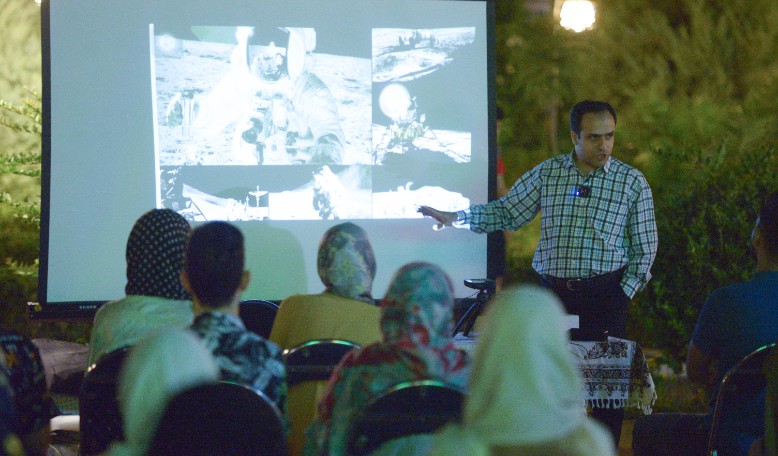Moon in High Resolution through the telescope of the 15th Science cafe


The 15th Mustafa(Pbuh) Prize Science Café, revolving around NASA’s Artemis program, was held on September 7, 2022.
MSTF Media reports:
The Mustafa Science and Technology Foundation (MSTF) hosted the 15th Mustafa Prize Science Café with the attendance of the Moon enthusiasts this time.
At the beginning of the event, a representative of the MSTF said: “We are going to focus on and discuss different aspects of NASA’s Artemis program tonight.”
The event also provided the chance of lunar observation and other astronomical objects observation through telescopes for the audience.
Kazem Kookaram, a renowned science journalist, gave a speech during the event.
He said the last manned mission to the Moon took place 50 years ago in Apollo 17 mission in 1972.
“The reason it is a long time since human beings last landed on the Moon is the high cost of this mission,” he said, adding “Now the goal is Mars. Going to the Moon paves the way for travelling to Mars. That’s why they are working on missions to the Moon now despite its high cost.”
The Artemis program is a Moon exploration program chiefly organized and led by the United States’ National Aeronautics and Space Administration (NASA).
“Although this program is led mainly by NASA, many countries are involved in it,” Kookaram noted.
During his speech, he also touched upon Apollo missions and elaborated on each.
In 2019, NASA Administrator announced that the new Moon landing program would be named after the goddess of the Moon in Greek mythology, Artemis.
“Artemis was the sister of Apollo in Greek mythology,” Kookaram said.
“Orion spacecraft is going to be used in Artemis program,” he said, noting that Orion is made by Europeans.
He emphasized that Artemis I will be launched uncrewed.
Artemis I was to be launched in late 2021, but the launch date was postponed to August 2022 due to engine problems. It was rescheduled to be launched on September 3, 2022, yet fuel leak caused another delay spanning a period between September 20 and October 4, 2022.
“Artemis Ⅱ will be crewed,” he said.
“The ultimate objective of Artemis program is to turn the Moon to a terminal through which going on other missions is made possible,” he continued.
“At least 4 astronauts will be present in Artemis Ⅱ mission, but they will not land on the Moon,” he highlighted.
According to NASA's website, “with Artemis missions, NASA will land the first woman and first person of color on the Moon.”
Kookaram said that “in Artemis Ⅲ mission, they land on the lunar south pole. They need to see whether they find water on the Moon.”
“If Artemis program turns out to be successful on the whole, human beings will have a permanent settlement on the Moon,” he noted.
As it is clarified on NASA’s website, NASA aims to “establish the first long-term presence on the Moon.”
“Then, we will use what we learn on and around the Moon to take the next giant leap: sending the first astronauts to Mars,” NASA explains.
The biggest challenge in traveling to Mars, according to Kookaram, is “the duration it takes for man to reach there. It takes about 8 months.”
He further talked about some facts about the Moon, its surface, and its structure.
After Kookaram’s speech, the participants were invited to observe the Moon through telescopes.
Science Café is one of the promotional events held by the Mustafa Science and Technology Foundation, promoting science and technology in the Islamic world. This event hosts experts from various fields of science, providing an informal environment for the public’s engagement with science by asking questions and sharing ideas with the guest speakers of the program and with each other.